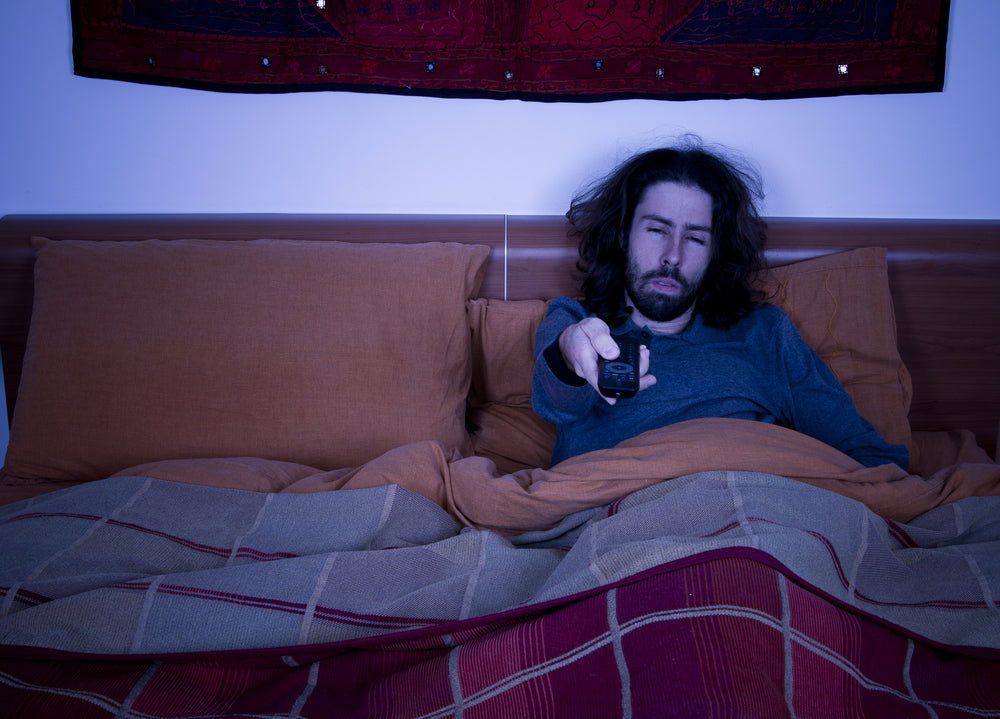Developing poor bedtime habits is something we’re all guilty of. Whether it’s starting a variety of screens before bed, succumbing to late-night cravings, or taking daytime naps, it’s likely that we’re all guilty of some type of bedtime self-sabotage. Sleep is something that everyone has to do--so why are so many of us just plain bad at getting a good night’s sleep? It doesn’t have to be so difficult.
We’ve compiled a list of the top bad sleeping habits and come up with some easy ways to avoid these pitfalls. Do any of these sound like you? If so, you need to make some changes so you can start sleeping better.
Haphazard Bedtime Routine
Humans are creatures of habit and our brains know it. Most people have several routines they go through on any given day: a wake-up routine, a gym routine, a work routine, etc. But bedtime is where a lot of us can abandon our routines and give in to our spontaneity--and this is not the right time to do that.
A bedtime routine, no matter how mundane, signals to our brains that we are getting ready to relax and fall asleep. This triggers a release of melatonin, the sleep hormone, that can help us fall asleep more quickly. If you don’t have a solid routine before bedtime, then your brain doesn’t realize it’s time to start prepping. This leaves you feeling awake and maybe even a little frustrated. Start by developing a small bedtime routine, even something as simple as showering and brushing your teeth. Once you have that down, your brain can start to catch up and do its job more efficiently.
Stressful, Messy Bedroom
Everyone with a cluttered bedroom go ahead and raise your hand *hand goes up*. Many of us see our bedroom as a sanctuary from the rules and regulations of work and life. It’s the one space where we can be our freest selves, and this can often mean we’re less likely to keep it clean and tidy. But messy spaces can also be stress-inducing.
When it comes to creating a relaxing space, stack the deck in your favor! Clear the clutter and try to create a more calming environment. Dim the lights, get some blackout curtains, try out aromatherapy or even a humidifier. All of these things will help your bedroom feel more like a sanctuary and less like an undone chore.
Nighttime Bingeing
You may think we mean Netflix, but we’re talking about food. Late-night snacks are the guilty pleasure of many, but it can also be part of the reason you’re not sleeping well. Being too full or too hungry before bed can distract you from falling asleep because it makes your brain focus on something besides rest.
While most might think of junk food as the only culprit here, beverages are equally to blame. You should avoid consuming caffeine or alcohol close to bedtime. Even though drinking alcohol may make you feel tired at first, the rebound that occurs after consumption can be strong enough to wake you up from a deep sleep.
Exercising Before Bed
Exercise is a crucial part of long term health and wellness, and busy schedules can make it feel impossible to get in a good sweat. No matter how much you may want to, avoid doing intense exercise too close to bedtime. As Legally Blonde taught all of us, exercising gives you endorphins, and endorphins will energize your brain and keep you awake longer than you might have been expecting.
If you want to make sure to get in an exercise, try to plan it for earlier in your day: either before the workday starts or right after it ends. Any later than that and you might regret it that night (and probably the next day!).
The Blue Light Menace
Most everyone has heard of the problems with blue light--the type of light emitted by electronics. But did you know that it’s also one of the potential reasons you’re not sleeping well? Blue light sends signals to your brain that it’s “daytime,” which can prevent the release of melatonin. Blue light could be coming from your TV, tablet, phone, or even eReader.
If you tend to use electronics before bed and find sleeping difficult, you should consider creating a routine without them. Creating a dark, distraction-free space that makes you forget about the outside world will help you sleep better.
Not Sounding Like You?
Did any of the bad habits on our list sound like you? If so, you have an action plan to try and improve your sleep! If not, then you should be asking yourself what other potential sleep problems you may be experiencing. If none of these apply to you and you still feel tired and sluggish after a night’s rest, then it’s possible you may be suffering from a sleep disorder like restless leg syndrome (RLS) or obstructive sleep apnea (OSA).
Especially if you could have untreated OSA, you should ask your doctor or a a quality sleep provider, like ApneaMed, about sleep testing (they can even do it at your home!). These tests will not only reveal your condition but lead to effective treatment options that sleep apnea providers can recommend to you. If you’re suffering from a sleep disorder, it’s important that you find the cause and a possible solution as fast as possible--this is where highly-qualified providers like ApneaMed can help you sleep better and feel happier. If left untreated, sleep disorders can lead to far more serious long-term health concerns.
Let’s all try to fix our bad sleep habits so we can get the quality, restful sleep we all deserve.

